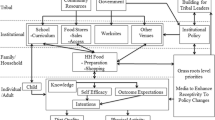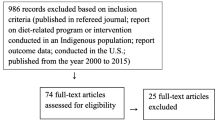Abstract
Introduction
The literature on community-based participatory research (CBPR) approaches for promoting healthy diet and nutrition and preventing and controlling obesity in African-American communities was systematically reviewed as part of the planning process for new research.
Methods
CBPR studies of diet, nutrition, and weight management among African-Americans were identified from 1989 through October 31, 2015, using PubMed and the Cumulative Index to Nursing and Allied Health Literature (CINAHL) databases and MeSH term and keyword searches.
Results
A total of 16 CBPR studies on healthy diet, nutrition, and weight management among African-Americans were identified; outcome evaluation results were available for all but two. Of the remaining 14 studies, 11 focused on adults, 1 on children, and 2 on both children and adults. Eight studies employed CBPR methods to address diet, nutrition, and weight management in church settings. Four had a cluster-randomized controlled design. Others had a pre-post test, quasi-experimental, or uncontrolled design. Only one study addressed four levels of the socioecological model; none addressed all five levels of the model. The studies identified in this review indicate that CBPR approaches can be effective for promoting healthy diet, nutrition, and weight management among African-American adults, but there is a need for additional studies with rigorous study designs that overcome methodologic limitations of many existing studies. There is only limited evidence for the effectiveness of CBPR approaches for promoting healthy eating and weight control among African-American children and adolescents.
Conclusion
To address health disparities, additional CBPR studies are needed to promote healthy diet, nutrition, and weight management in African-American communities. Of particular interest are multilevel CBPR studies that include interventions aimed at multiple levels of the socioecological model.

Similar content being viewed by others
References
Ogden CL, Carroll MD, Kit BK, Flegal KM. Prevalence of obesity and trends in body mass index among US children and adolescents, 1999-2010. JAMA. 2012;307:483–90.
An R. Prevalence and trends of adult obesity in the US, 1999–2012. Obesity. 2014 http://www.hindawi.com/journals/isrn/2014/185132/ Accessed November 17, 2015.
Kumanyika SK, Whitt-Glover MC, Haire-Joshu D. What works for obesity prevention and treatment in black Americans? Research directions. Obesity Reviews. 2014;15(Suppl 4):204–12.
Svetkey LP, Ard JD, Stevens VJ, Loria CM, Young DY, Hollis JF, et al. Predictors of long-term weight loss in adults with modest initial weight loss, by sex and race. Obesity (Silver Spring). 2012;20:1820–8.
Grier SA, Kumanyika SK. The context for choice: health implications of targeted food and beverage marketing to African Americans. Am J Public Health. 2008;98:1616–29.
Powell LM, Szcypka G, Chaloupka FJ. Trends in exposure to television food advertisements among children and adolescents in the United States. Arch Pediatr Adolesc Med. 2010;164:794–802.
Larson NI, Story MT, Nelson MC. Neighborhood environments. Disparities in access to healthy foods in the U.S. Am J Prev Med. 2009;36:74–81.
Gordon-Larsen P, Nelson MC, Page P, Popkin BM. Inequality in the built environment underlies key health disparities in physical activity and obesity. Pediatrics. 2006;117:417–24.
Macartney S, Bishaw A, Fontenot K. Poverty rates for selected detailed race and Hispanic groups by state and place: 2007-2011. U.S. Department of Commerce, Economics and Statistics Amininistration, U.S. Census Bureau, 2013. http://www.census.gov/prod/2013pubs/acsbr11-17.pdf. Accessed November 17, 2015.
Bleich SN, Wang YC, Wang Y, Gortmaker SL. Increasing consumption of sugar-sweetened beverages among US adults: 1988-1994 to 1999-2004. Am J Clin Nutr. 2009;89:372–81.
James DC. Factors influencing food choices, dietary intake, and nutrition-related attitudes among African-Americans: application of a culturally sensitive model. Ethn Health. 2004;9:349–67.
Blocker DE, Fruedenberg N. Developing comprehensive approaches for the prevention and control of obesity among low-income, urban, African-American women. J Am Med Womens Assoc. 2001;56:59–64.
Sallis JF, Glanz K. Physical activity and food environments: solutions to the obesity epidemic. Milbank Q. 2009;87:123–54.
Sallis JF, Cervero RB, Ascher W, Henderson KA, Kraft MK, Kerr J. An ecological approach to creating active living communities. Annu Rev Public Health. 2006;27:297–322.
Dietz WH. The response of the US Centers for Disease Control and Prevention to the obesity epidemic. Annu Rev Public Health. 2015;36:575–96.
Lemacks J, Wells BA, Ilich JZ, PA Ralston. Interventions for improving nutrition and physical activity behaviors in adults African American populations: a systematic review, January 2000 through December 2011. Prev Chron Dis 2013; 10:E99 http://wwwcdcgov/pcd/issues/2013/12_0256htm Accessed November 17, 2015.
Newton Jr RL, Griffith DM, Kearney WB, Bennett GG. A systematic review of weight loss, physical activity and dietary interventions involving African American men. Obes Rev. 2014;15(Suppl 4):93–106.
Ammerman A, Washington C, Jackson B, Weathers B, Campbell M, Davis G, et al. A church-based nutrition intervention designed for cultural appropriateness, sustainability, and diffusion. Health Promot Pract. 2002;3:286–301.
Campbell MK, Demark-Wahnefried W, Symons C, Kasbeek WD, Dodds J, Cowan A, et al. Fruit and vegetable consumption and prevention of cancer: the Black Churches United for Better Health Project. Am J Public Health. 1999;89:1390–6.
Choudhry S, McClinton-Powell L, Solomon M, Davis D, Lipton R, Darukhanavala A, Steenes A, et al. Power-up: a collaborative after-school program to prevent obesity in African American children. Prog Community Health Partnersh. 2011;5:363–73.
Dodani S, Fields JZ. Implementation of the fit body and soul, a church-based life style program for diabetes prevention in high-risk African Americans. A feasibility study. Diabetes Educ. 2010;36:465–72.
Freedman DA, Bell BA, Collins LV. The Veggie project: a case study of a multi-component farmers’ market intervention. J Primary Prev. 2011;32:213–24.
Goldfinger JZ, Arniella G, Wylie-Rosett J, Horowitz CR. Project HEAL: peer education leads to weight loss in Harlem. J Health Care Poor Underserved. 2008;19:180–92.
Harmon BE, Adams SA, Scott D, Gladman YS, Ezell B, Hebert JR. Dash of faith: a faith-based participatory research study. J Relig Health. 2014;53:747–59.
Landry AS, Thomson JL, Madson MB, Zoellner JM, Mohn RS, Noble J, et al. Psychosocial constructs and postintervention changes in physical activity and dietary outcomes in a lifestyle intervention, Hub City Steps, 2010. Prev Chron Dis 2015; 12:140525. www.cdc.gov/pcd/issues/2015;/14_o525.htm Accessed November 17, 20115.
Lasco RA, Curry RH, Dickson VJ, Powers J, Menes S, Merritt RK. Participation rates, weight loss, and blood pressure changes among obese women in a nutrition-exercise program. Public Health Rep. 1989;104:640–6.
Scarinci IC, Moore A, Wynn-Wallace T, Cherrington A, Fouad M, Li Y. A community-based, culturally relevant intervention to promote healthy eating and physical activity among middle-aged African American women in rural Alabama: findings from a group randomized controlled trial. Prev Med. 2014;69:13–20.
Schulz AJ, Zenk S, Odoms-Young A, Hollis-Neely T, Nwankwo R, Lockett M, Ridella W, et al. Healthy eating and exercising to reduce diabetes: exploring the potential of social determinants of health frameworks within the context of community-based participatory diabetes prevention. Am J Public Health. 2005;95:645–51.
Parker VG, Coles C, Logan BN, Davis L. The LIFE Project: a community-based weight loss intervention program for rural African American women. Fam Comm Health. 2010;33:133–43.
Ries AV, Blackman LT, Page RA, Gizlice Z, Benedict S, Barnes K, et al. Goal setting for health behavior change: evidence from an obesity intervention for low-income women. Rural Remote Health 2014; 14:2682. http://www.rrh.org.au Accessed November 17, 2016.
Wilcox S, Parrot A, Baruth M, Laken M, Condrasky M, Saunders R, et al. The Faith, Activity, and Nutrition Program. A randomized controlled trial in African-American churches. Am J Prev Med. 2013;44:122–31.
Woods G, Levinson AH, Jones G, Kennedy RL, Johnson LC, Tran ZV, et al. The Living Well By Faith Health and Wellness Program for African Americans: an exemplar of community-based participatory research. Ethn Dis. 2013;23:223–9.
Kim KH, Linnan L, Campbell MK, Brooks C, Koenig HG, Wiesen C. The WORD (Wholeness, Oneness, Righteousness, Deliverance): a faith-based weight-loss program utilizing a community-based participatory research approach. Health Educ Behav. 2008;35:634–50.
Merete C, Falcon LM, Tucker KL. Vitamin B6 is associated with depressive symptomatology in Massachusetts elders. J Am Coll Nutr. 2008;27:421–7.
Berkley-Patton JY, Moore E, Berman M, Thompson CB, Schleicher T, Hawes SM. Assessment of HIV-related stigma in a US faith-based HIV education and testing intervention. J Int AIDS Soc. 2013;16(Suppl 2):18644.
Smith SA, Whitehead MS, Sheats JQ, Ansa BE, Coughlin SS, Blumenthal DS. Community-based participatory research principles for the African American community. J Georgia Public Health Assoc. 2015;5:52–6.
Corbie-Smith G, Adimora AA, Youmans S, Muhammad M, Blumenthal C, Ellison A, et al. Project GRACE: a staged approach to development of a community-academic partnership to address HIV in rural African American communities. Health Promot Pract. 2011;12:293–302.
Derose KP, Mendel PJ, Kanouse DE, Blumenthal RN, Castenada LW, Hawes-Dawson J, et al. Learning about urban congregations and HIV/AIDS: community-based foundations for developing congregational health interventions. J Urban Health. 2010;87:617–30.
Peterson J, Atwood JR, Yates B. Key elements for church-based health promotion programs: outcome-based literature review. Public Health Nurs. 2002;19:401–11.
Swinburn B, Gill T, Kumanyika S. Obesity prevention: a proposed framework for translating evidence into action. Obes Rev. 2005;6:23–33.
Kumanyika SK, Obarzanek E, Stevens VJ, Hebert PR, Whelton PK. Weight loss experience of black and white participants in NHLBI-sponsored clinical trials. Am J Clin Nutr. 1991;53:1631S–8S.
Acknowledgments
This work was funded by the National Cancer Institute (R01CA166785).
Author information
Authors and Affiliations
Corresponding author
Rights and permissions
About this article
Cite this article
Coughlin, S.S., Smith, S.A. Community-Based Participatory Research to Promote Healthy Diet and Nutrition and Prevent and Control Obesity Among African-Americans: a Literature Review. J. Racial and Ethnic Health Disparities 4, 259–268 (2017). https://doi.org/10.1007/s40615-016-0225-0
Received:
Revised:
Accepted:
Published:
Issue Date:
DOI: https://doi.org/10.1007/s40615-016-0225-0




